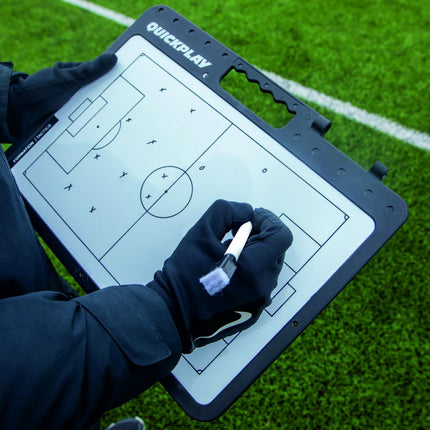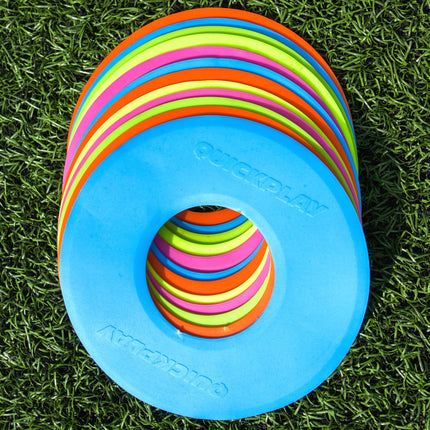As a performance manager working with athletes all over the globe, I can say unequivocally, that the level of competition is increasing year after year. Now more than ever, If you want to develop your football players to the highest level, you must look at every opportunity available to optimize their performance. In my experience, the path towards this degree of optimization happens by understanding the science involved in enhancing human performance.
DON’T FORGET TO TRAIN THE BRAIN
Every player has their own unique set of skills. But, a key area that has often been under managed at the youth level, that many elite footballers have in common is their upgraded cognitive performance. Brain training is just as important as physical training. By incorporating cognitive training into your athletes' training schedule, you can help your athletes improve many of their cognitive abilities, such as focus, concentration, and decision-making. Research shows that these enhanced skills will ultimately lead to better performance on the pitch.
You can think of the brain like it is a muscle - it needs exercise to stay strong. Like a muscle that regenerates tissue for strength, the brain can enlarge the neuropathways necessary to perform functions ideal for the match of football. Therefore, it is crucial to Incorporate regular cognitive training sessions into your athletes' schedules to see improvement in their overall performance.
MAKE TRAINING ENJOYABLE
A remarkable recent study suggests that a skill may be learned after 400-500 repetitions, yet if the player perceives the training as “play” it may only take 20 to 30 repetitions.
Training the mind is just as important as training the body. Take the time to invest in your athletes' cognitive development and I promise you it will pay off in their performance on the pitch.
TRAIN LIKE A PRO
Dr. Peter J. Fadde said that “Expert Performers” exhibit an uncanny ability to size up dynamic situations and to make good, fast, and largely unconscious decisions. And that it’s possible to systematically train intuitive decision-making.”
Recognition skills such as selective attention, pattern recognition, and situation awareness can be trained as a way of accelerating expertise in performance contexts that require quick decisions and immediate actions. Fadde goes on to say, “by accelerating acquisition of the intuitive decision-making aspect of expertise it is increasingly acknowledged as both valuable and trainable.”
One of the most important skills to learn in football is scanning. In the past two decades, increasing amounts of research have found a direct correlation between scanning and technical execution in elite football players.
WHAT IS SCANNING?
According to Professor Geir Jordet, the leading researcher in the role of visual perception in football, scanning can be defined as: “head movement where a player’s face is temporarily directed away from the ball to gather information in preparation for subsequently engaging with the ball.” When managers instruct players to “check their shoulder” before receiving a pass, they are effectively telling them to “scan.”

WHY IS SCANNING IMPORTANT?
By scanning, a player is able to survey their options before they receive a pass. They can collect split-second information on the movement of their teammates, and the positioning of their defenders. This will improve the speed of their decision-making and execution.
Scanning more frequently opens up more options for a player once they are on the ball. McGuckian et al. found that higher scanning frequency “resulted in a higher likelihood of turning with the ball, playing a pass in the attacking direction, and playing a pass to an area that is opposite to which it was received from.” Better decision-making often leads to better execution. Furthermore, Jordet, Bloomfield, and Heijmerkx found that scanning frequency was positively correlated with passing percentage, and forward passing percentage in elite football players.
“Think quickly, look for spaces. That’s what I do: look for spaces.
All day. I’m always looking. All day, all day.”
— Xavi
RECREATE MATCH SCENARIOS
Johann Cruyff said and researchers in the pitch of “Representative Design” would agree that: “Training is practicing scenarios that will occur often in the match.” Begin by thinking of moments or actions that you perform during a match, and reverse engineer your drills from there. Key things to think about include:
- Positioning on the pitch
- The direction you would be scanning
- The options/decisions you would make in the situation (passing, dribbling, shooting, etc.)
COMBINE PERCEPTION, PROCESSING & ACTION
Scanning is not simply looking in a specific direction, you must process the information. To replicate this, incorporate randomized external cues to the area you should be scanning, and associate each cue with a decision you would make. You can do this with the QUICKPLAY Cognitive Cones. it is best to use colors as your cues. Colors are context-specific to what you scan for in live play (jerseys, shorts, socks, etc.) When training scanning, it’s best to use cues that you can identify from quick glances or “microscans”. Use the Agility Poles to raise the Cognitive Cones off the ground for faster scanning and to see the pitch in a more representative and accurate sight-line. The Shoulder Check, Turn & Pass activity on the BlazePod App is a great way to train scanning and its corresponding cognitive characteristics.

INTENSIFY MATCH SPEED
Progress the speed and intensity of your drills to prepare yourself for live matches. Remember that how you train is how you play. The Shoulder Check & Turn activity on the BlazePod App with the Smart Rebound Board is a great way to intensify your training.
Drills like these will help build good scanning habits that will transfer effectively over to live play. Improving this area of your match could immediately lead to improvements in your passing accuracy, and your ability to make more progressive, decisive plays during a match.
- Jordet, Geir, et al. "Scanning, contextual factors and association with performance in English Premier League Footballers: An investigation across a season." Frontiers in Psychology 11 (2020).
- McGuckian, Thomas B., et al. "Don’t turn blind! The relationship between exploration before ball possession and on-ball performance in association football." Frontiers in psychology (2018)
- Jordet, Geir, Jonathan Bloomfield, and Johan Heijmerikx. "The hidden foundation of pitch vision in English Premier League (EPL) football players." Proceedings of the MIT sloan sports analytics conference. 2013.
- Jordet, Geir. "Perceptual training in football: An imagery intervention study with elite players." Journal of applied sport psychology 17.2 (2005)
- Michael Cummings
www.coach-cummings.com
"Michael Cummings is a strength and conditioning manager in San Diego, CA. For more than 20 years he has managed Olympic and professional athletes to youth athletes. He is also a certified Rehabilitation Specialist and Brain Trainer. He is passionate about upgrading the performance of all athletes."







